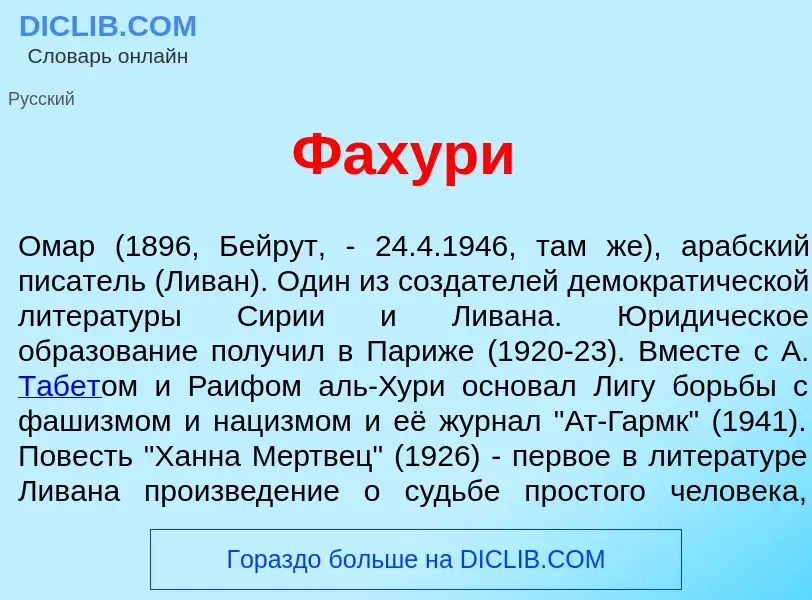Enter a word or phrase in any language 👆
Language:
Translation and analysis of words by artificial intelligence
On this page you can get a detailed analysis of a word or phrase, produced by the best artificial intelligence technology to date:
- how the word is used
- frequency of use
- it is used more often in oral or written speech
- word translation options
- usage examples (several phrases with translation)
- etymology
What (who) is Фахури - definition
Фахури
Омар (1896, Бейрут, - 24.4.1946, там же), арабский писатель (Ливан). Один из создателей демократической литературы Сирии и Ливана. Юридическое образование получил в Париже (1920-23). Вместе с А. Табетом и Раифом аль-Хури основал Лигу борьбы с фашизмом и нацизмом и её журнал "Ат-Гармк" (1941). Повесть "Ханна Мертвец" (1926) - первое в литературе Ливана произведение о судьбе простого человека, ставшего жертвой социальных условий. Рассказы, публицистические статьи и очерки Ф. преследовали цель "пробуждения соотечественников" (сборник "Заколдованная дверь", 1926). С конца 20-х гг. выступал и как литературный критик, ратовавший за создание новой реалистической литературы, связанной с действительностью (сборник "Четыре части", 1926), и выдвинувший лозунг "служения народу" (сборник "Писатель на рынке", 1944). Тема борьбы за национальное освобождение и социальный прогресс стали ведущими в публицистических сборниках 40-х гг.: "Без пощады" (1942), "Ливанская действительность" 1943), Советский союз - краеугольный камень в строительстве нового мира" (1944). Переводил А. Франса и Р. Роллана.
Лит.: Юсупов Д. И., Творческий путь Омара Фахури, М., 1958.
М. С. Киктев.
ФАХУРИ
Омар (1896-1946) , арабский писатель (Ливан). Один из основателей антифашистского журнала "Ат-Тарик" (1941). Статьи, очерки и рассказы (сборник "Заколдованная дверь", 1926). Публицистика (книга "Нет пощады", 1942). Труды по истории арабской литературы.
Examples of use of Фахури
1. Родители 16-летних ливанских подростков Гани и Раши Фахури вообще живут в Швеции.

